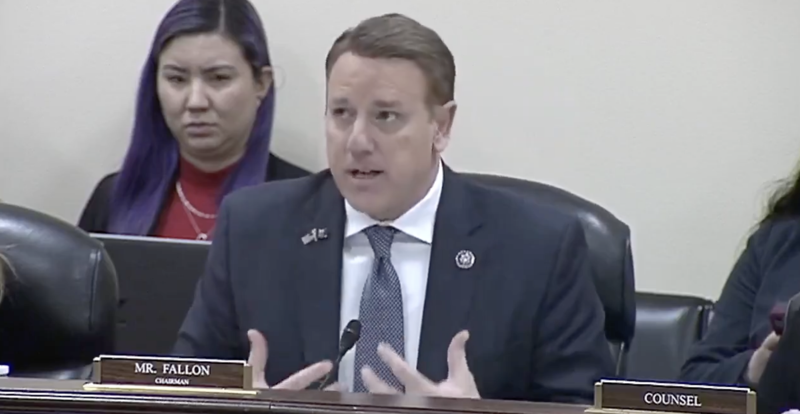Members of the U.S. House blasted the U.S. Department of Energy again for failing to respond to requests for information about its ban on liquified natural gas (LNG) exports.
In January, the DOE announced a partial export ban, prompting Louisiana and Texas to sue, arguing the ban was illegal. The Gulf states lead the U.S. in LNG exports. A federal judge agreed, and said the ban was implemented “completely without reason or logic and is perhaps the epiphany of ideocracy,” The Center Square reported.
The Biden administration claimed the ban was necessary because LNG exports increased domestic energy costs and created “perilous impacts of methane on our planet.” Both claims were fact checked by The Center Square to be false, citing federal data refuting the claims.
Despite the court ruling, the DOE argued it needed to conduct a study before it permanently lifts the ban, prompting an investigation by the U.S. House Committee on Oversight and Accountability.
U.S. Rep. Pat Fallon, R-Texas, who chairs the committee’s Subcommittee on Economic Growth, Energy Policy, and Regulatory Affairs held a hearing as part of the ongoing investigation. The DOE is still withholding information the committee requested, he said, and “the administration has refused to be transparent.”
DOE’s Assistant Secretary of Energy for Fossil Energy and Carbon Management Brad Crabtree testified on Wednesday and at a hearing Fallon chaired in April. In May, Energy Secretary Jennifer Granholm also appeared before the full committee.
In April, Crabtree said a new analysis was “well underway” to evaluate whether additional LGN exports were in the public interest. In May, Granholm said the study would be completed, and the ban would be lifted in the first quarter of 2025.
Since the ban was issued, “energy companies investing in new LNG export projects have struggled to navigate an uncertain future,” Fallon said. “The holding pattern imposed by the ban has led to significant project delays, high regulatory and legal costs, and a great deal of uncertainty for the workforces and communities supporting these large-scale, capital-intensive projects.”
Crabtree said the decision was similar to one made in 2012, saying “we chose to pause our consideration of applications.”
“Oh, I know you did and I think that was misguided, I think it was a big mistake,” Fallon replied.
Fallon also said the study and exports could occur simultaneously. LNG consumers “are either going to get it from New Mexico or Texas or some other state in our union, or they are going to get it from Moscow. I would far rather have them get it from us.”
At one point, Crabtree implied that the LNG ban didn’t receive public opposition, despite a multistate lawsuit against it. Multiple organizations opposed the ban, including the Texas Independent Producers and Royalty Owners Association, which has highlighted the economic and geopolitical benefits of LNG exports, with Texas exports providing a lifeline to European countries, The Center Square reported.
U.S. Rep. Scott Perry, R-Penn., pressed Crabtree, saying, “What you’re implying is that no one opposed it.”
“I am not aware of public opposition, there is a range of views as there is in this country and among individual policy makers in those countries clearly,” Crabtree replied.
“But are you aware that anybody publicly supported it? Any?,” Perry asked. “No,” he said.
The ban faced bipartisan opposition in the U.S. House and Senate. In a February hearing held by the U.S. Senate Natural Resources Committee, experts cited economic and national security concerns, arguing Russia would benefit from it.
A coalition of roughly two dozen state attorneys general also called on the president to end the ban, saying it violated federal law. Texas Democrats also opposed the ban, arguing LNG exports “hold significant benefits for the U.S. economy, energy security, and bolstering our alliances with U.S. partners across the world. As the United States continues to lead in global stability and energy resources, the export of U.S. LNG is a linchpin for fostering strong international partnerships, diversifying energy supplies, and reducing dependence on volatile regions.”
U.S. Rep. Clay Higgins, R-Louisiana, demanded that the DOE produce the requested documents, asking Crabtree if he ran the research and development programs, which he said he did.
“And these are research documents, correct? These 4,354 research documents out of your office. This Committee wants those pages, will you deliver those 4,354 pages to this Committee very quickly? Or not?” Higgins asked. “… so I am asking you, in your capacity of your office, you have possession of these 4,354 pages of documents. This Committee demands them, will you deliver them or not?”
“I am not responsible for document production, I will take your request back to the team,” Crabtree replied.







